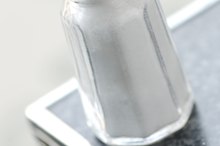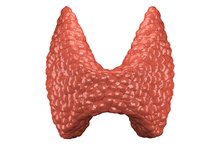Foods Rich in Potassium Iodide
Potassium iodide is a salt with a similar makeup to table salt 1. In fact, it's the same form of iodine used in table salt. According to Medicine Net, it's used in preparation for thyroid surgery, to combat high thyroid levels and to loosen mucus in the respiratory system. The recommended daily intake of iodine is 150 micrograms for men, 120 for women, 70 to 150 for children and 50 to 60 for infants, according to the Healthy Eating Club. Potassium iodide is usually found in pill and droplet form, but there are a variety of of foods that contain an abundant source of natural iodine 1.
Kelp
Kelp, also known as the sea vegetable, is one of the richest known sources of iodine. According to the World's Healthiest Foods, 1/4 cup of kelp has only 9 calories and 276.7 percent of your daily iodine needs 2.
Low-Fat Yogurt
Sodium & Thyroid Problems
Learn More
Low-fat yogurt is another plentiful source of iodine. The World's Healthiest Foods says that on average, it contains 155 calories per cup and has 51.8 percent of your daily iodine needs, along with vitamins D and C. To fulfill your daily iodine needs through low-fat yogurt, eat two cups per day 2.
2 Percent Cow's Milk
The World's Healthiest Foods says 2 percent cow's milk is the third-richest source of iodine 2. One cup contains 39 percent of your daily iodine needs and only 121 calories. To meet your daily iodine needs with milk, drink 2.5 cups per day.
Related Articles
References
- Medicine Net: What is Potassium Iodide?
- The World's Healthiest Foods: Top foods with iodine
- American Thyroid Association. Iodine Deficiency. 2020.
- Eastman CJ, Zimmermann MB. The iodine deficiency disorders. In: Feingold KR, Anawalt B, Boyce A, et al., editors. Endotext. South Dartmouth, MA: MDText.com, Inc. Updated February 6, 2018.
- Ahad F, Ganie SA. Iodine, Iodine metabolism and Iodine deficiency disorders revisited. Indian J Endocrinol Metab. 2010;14(1):13-17.
- Kostoglou-athanassiou I, Ntalles K. Hypothyroidism - new aspects of an old disease. Hippokratia. 2010;14(2):82-87.
- American Thyroid Association. Hypothyroidism in Children and Adolescents. 2020.
- National Institutes of Health, Office of Dietary Supplements. Iodine. Updated July 9, 2019.
- U.S. National Library of Medicine. Congenital hypothyroidism. Updated February 11, 2020.
- Johnson LE. Iodine. Merck Manual Professional Version. Updated October 2018.
- Murthy MB, Krishnamurthy B. Severe irritant contact dermatitis induced by povidone iodine solution. Indian J Pharmacol. 2009;41(4):199-200. doi:10.4103/0253-7613.56069
- Puchalski AR, Chopra IJ. Radioiodine treatment of differentiated thyroid cancer despite history of 'iodine allergy'. Endocrinol Diabetes Metab Case Rep. 2014;2014:130084. doi:10.1530/EDM-13-0084
- Schabelman E, Witting M. The relationship of radiocontrast, iodine, and seafood allergies: a medical myth exposed. J Emerg Med. 2010;39(5):701-707. doi:10.1016/j.jemermed.2009.10.014
- National Institutes of Health, Office of Dietary Supplements. Iodine. Updated July 9, 2019.
- American Cancer Society. Radioactive Iodine (Radioiodine) Therapy for Thyroid Cancer. Updated March 14, 2019.
- Centers for Disease Control and Prevention. Potassium iodide (KI). Updated April 4, 2018.
- Kalra S, Unnikrishnan AG, Sahay R. The hypoglycemic side of hypothyroidism. Indian J Endocrinol Metab. 2014;18(1):1-3.doi:+10.4103/2230-8210.126517
Writer Bio
Jolie Hobbs has been writing since 2000 and has gained recognition from the University of Portland for a 2006 essay she wrote on the ethics of human cloning. She owns Moxie Personal Training and is pursuing a Bachelor of Science in exercise physiology at Portland State University.









